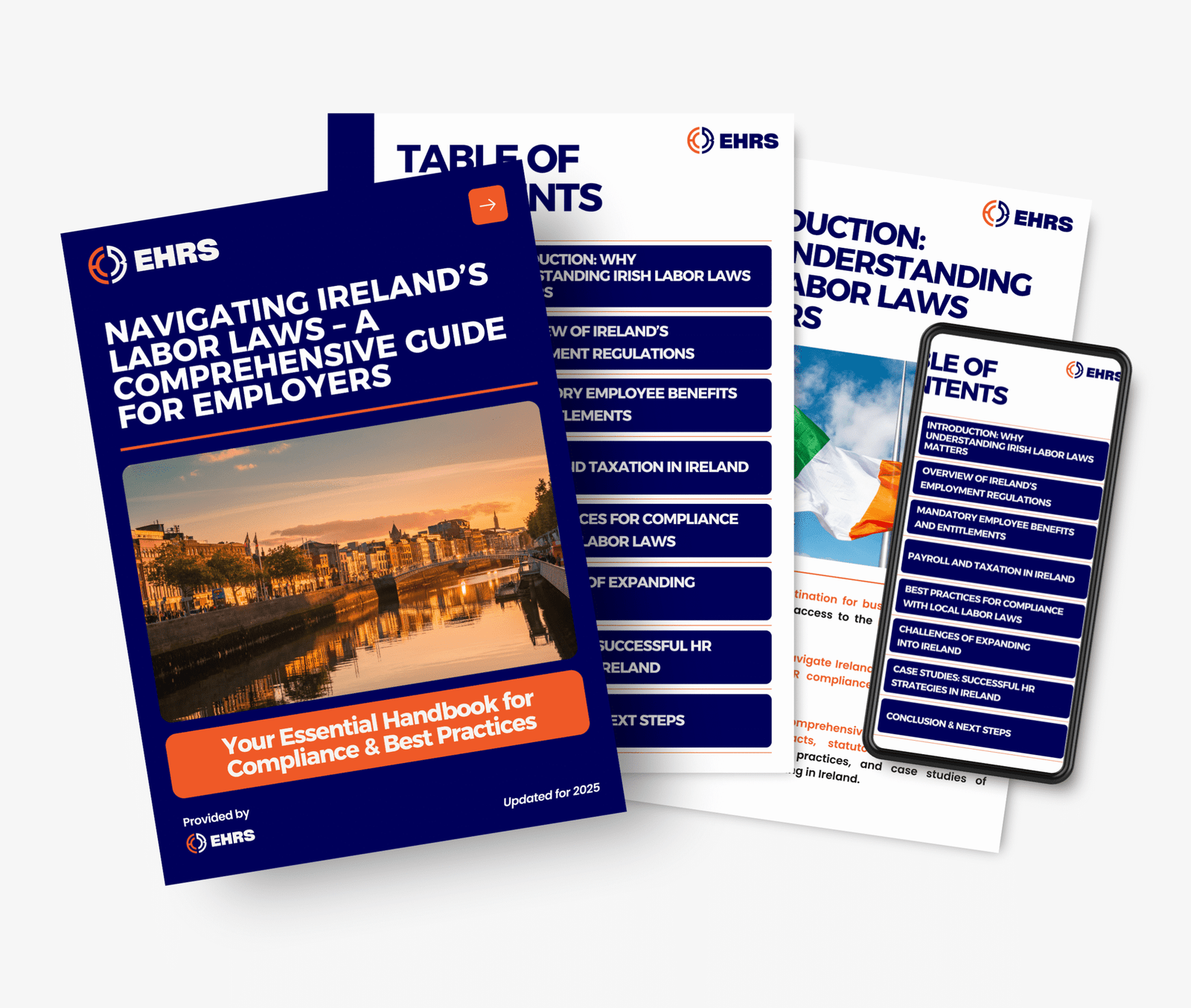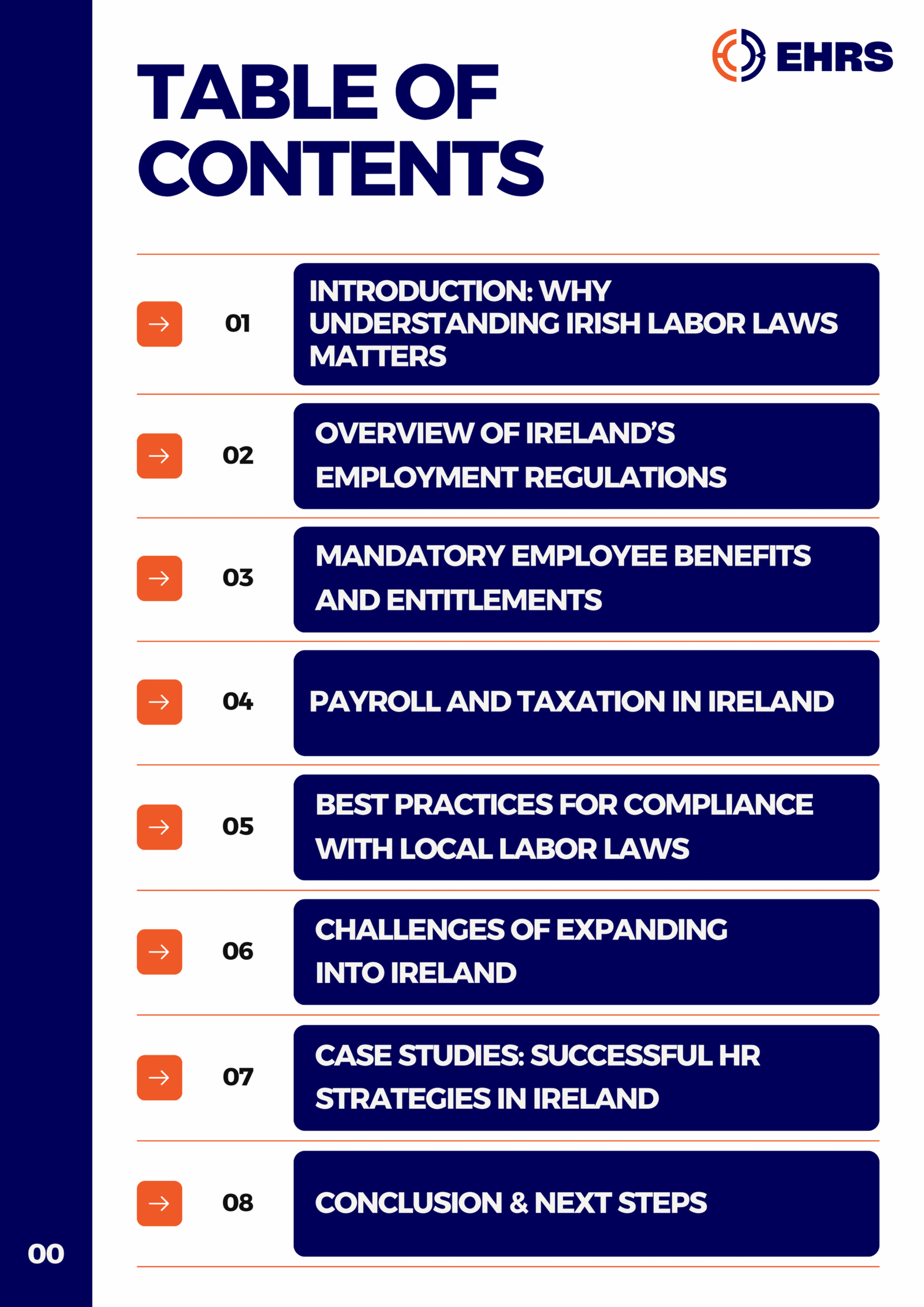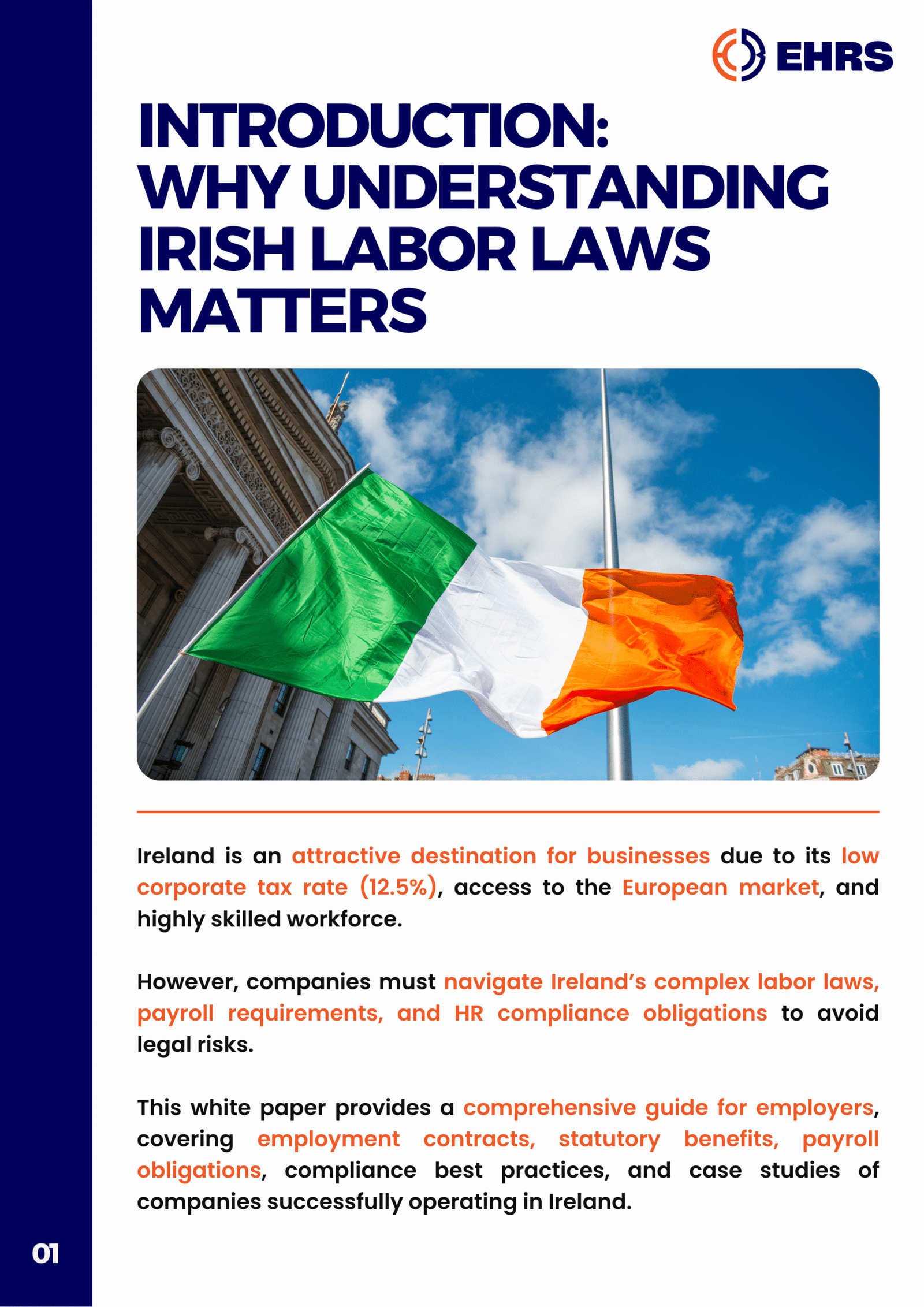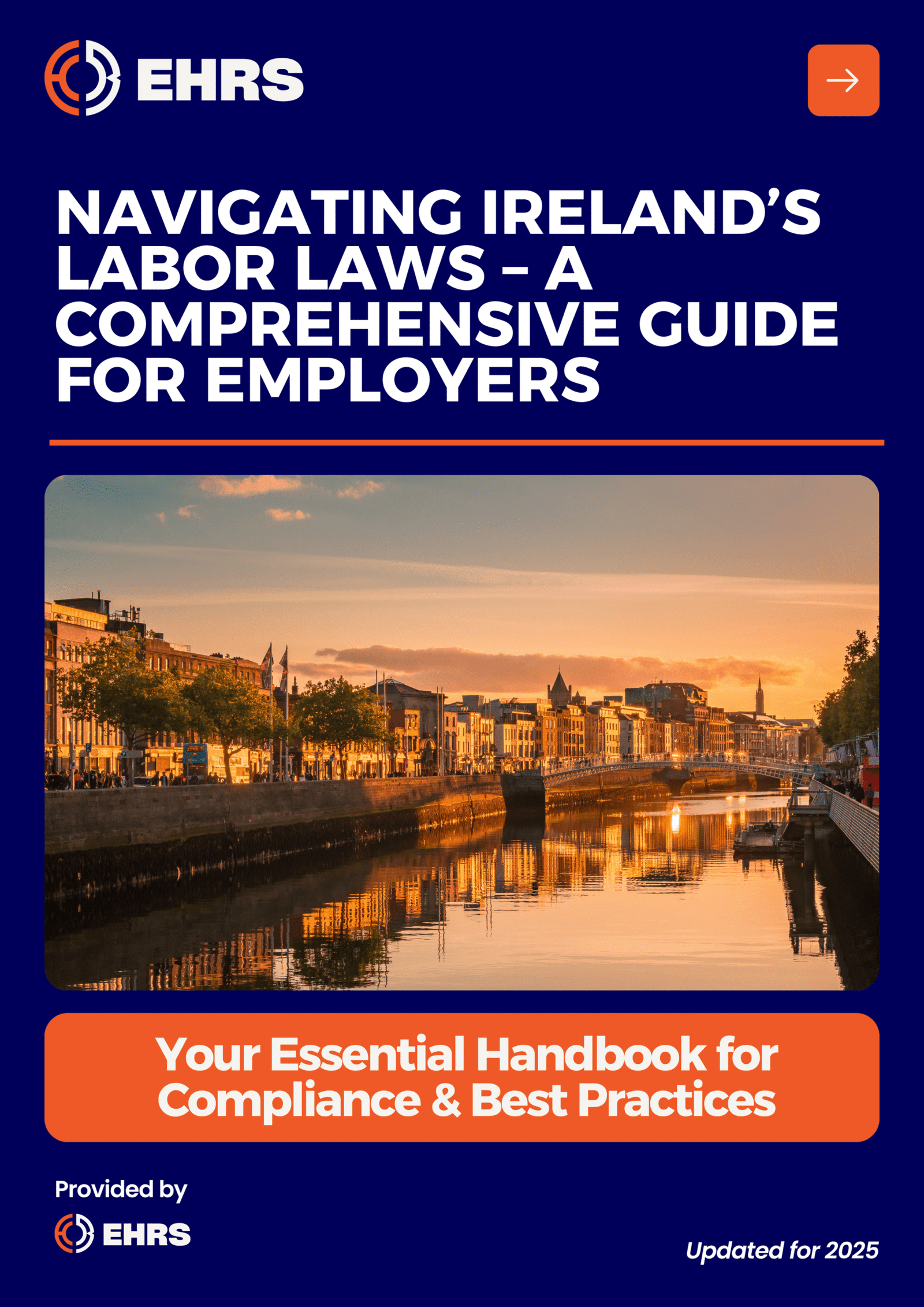IRELAND
List of countries
HR Services for Ireland
Hire in Ireland without opening a local entity. We manage employment contracts in line with Irish labor law, handle social insurance and tax registrations, oversee payroll, and ensure full compliance with local regulations. Our expert HR services for Ireland help your business expand efficiently while staying fully compliant.
According to the U.S. Department of State, Ireland continues to be one of the most attractive investment destinations in Europe, known for its open economy, pro-business environment, and strong ties to the United States. As a gateway to the EU single market, Ireland offers low corporate tax rates, robust legal protections, and a skilled, English-speaking workforce. American companies are among the largest employers in Ireland, particularly in sectors like technology, pharmaceuticals, finance, and life sciences. The country ranks high for ease of doing business and is widely recognized for its transparency and innovation-friendly policies.
However, HR operations in Ireland can still pose challenges for U.S. and UK companies unfamiliar with local employment law, statutory benefits, and collective bargaining frameworks. Employment contracts must comply with detailed national legislation, and employers must adhere to rules around working time, paid leave, pension contributions, and data protection (including GDPR). Internal HR teams without local expertise may face delays and legal exposure. By outsourcing HR to a trusted local partner like EHRS, companies can ensure all employment practices—from contracts and payroll to compliance and documentation—are fully aligned with Irish and EU labor standards, enabling faster, risk-free market entry and long-term operational stability.
ALL YOU NEED TO KNOW ABOUT
HR OUTSOURCING IN IRELAND
IRISH EMPLOYMENT
REGULATIONS TO KNOW
THE BENEFITS OF
EXPANSION IN IRELAND
THE CHALLENGES OF
EXPANSION IN IRELAND

Check our free HR guide to help you quickly improve your HR in Ireland
FAQ for Ireland
Learn more about Ireland
Free Download
Request your free guide and receive it immediately

All You Need to Know About Outsourcing
Your HR in Ireland with EHRS
Comprehensive HR Outsourcing Support
EHRS delivers full-spectrum HR support in Ireland, managing employment contracts, payroll, onboarding, time tracking, and statutory compliance. Our expert HR services for Ireland allow you to scale your operations confidently while we handle the complexity of local employment law.
Expert Navigation of Irish Employment Law
Irish labor legislation includes strict rules on contract terms, probation, statutory benefits, and termination procedures. EHRS ensures your HR practices are compliant from day one, helping you avoid legal risk and operational delays.
Scalable and Efficient HR Solutions
Whether you’re launching in Dublin or expanding your EMEA team, EHRS offers scalable HR solutions that adapt to your growth. Our local expertise supports both startups and global enterprises entering the Irish market.
Irish Employment Regulations to Know
Employment Contracts
In Ireland, all employees must receive a written contract of employment within five days of starting work, including core terms such as pay, hours, and job title. As part of our comprehensive HR services for Ireland, we ensure all contracts comply with national legislation and the EU’s Transparent and Predictable Working Conditions Directive.
Working Hours & Leave
The standard workweek is 39–40 hours. Employees are entitled to a minimum of four weeks of paid annual leave and nine public holidays. The Organisation of Working Time Act governs rules on rest breaks, overtime, and night work.
Social Security & Pension Obligations
Employers must register with the Revenue Commissioners and make Pay Related Social Insurance (PRSI) contributions on behalf of employees. They are also required to offer access to a Personal Retirement Savings Account (PRSA) if no occupational pension scheme is in place.
The Benefits of Expansion in Ireland
English-Speaking EU Member
Ireland is the only native English-speaking country in the Eurozone, offering frictionless communication and regulatory access to both EU and international markets—making it an ideal gateway for U.S. and UK companies.
Highly Skilled Workforce
Ireland’s workforce is among the most educated in Europe, particularly in tech, life sciences, finance, and professional services. The country is home to many top universities and R&D hubs.
Pro-Business Environment
Ireland offers a low corporate tax rate (12.5%), transparent regulation, and robust support for foreign direct investment—making it one of the most business-friendly jurisdictions in Europe.
The Challenges of Expansion in Ireland
Evolving Employment Law
Ireland’s labor law is dynamic, with regular updates to working time regulations, probation periods, and remote work entitlements. Staying compliant requires active monitoring and local expertise.
High Labor Costs in Urban Centers
While the workforce is highly skilled, salaries and employment costs—especially in Dublin—can be higher than the EU average, requiring careful budgeting and compensation planning.
Statutory and Tax Reporting Requirements
Irish employers must meet strict obligations on tax filings, PRSI contributions, and benefit reporting through the Revenue’s digital PAYE system. Without a local HR partner, these processes can become resource-intensive.
Talk to an HR specialist about payroll, compliance, and audits today.
Expand into Ireland with confidence.
Most Asked Questions
About Ireland
Why do I need a detailed employment contract in Ireland? Isn’t verbal agreement enough?
While verbal agreements are technically valid in Ireland, they lack clarity and can lead to costly disputes over terms like pay, duties, or working hours. Irish law also requires a written statement of terms for employees.
Why It’s Risk-Free: We draft compliant contracts that clearly outline employee rights and obligations, protecting your business from misunderstandings or legal claims.
Probation periods seem unnecessary. Are they really needed in Ireland?
Without a probation period, employees can claim full statutory protections from day one, making it harder to terminate underperformers. Probation periods, capped at six months (extendable to 12), provide a fair assessment window.
Why It’s Risk-Free: We structure probation periods that comply with Irish law while giving you flexibility during the onboarding phase.
Do I need to pay overtime? Isn’t a salary enough to cover extra hours?
Overtime pay is not mandatory in Ireland unless specified in the contract. However, failing to clarify overtime arrangements can lead to disputes or claims under minimum wage laws.
Why It’s Risk-Free: We ensure your contracts address overtime clearly, avoiding ambiguity and protecting your company from potential disputes.
Do I need to provide sick pay? Isn’t that covered by the state?
While Ireland recently introduced statutory sick pay (up to three days in 2023, increasing to 10 by 2026), employers historically weren’t required to provide it. Employees often expect additional sick leave benefits.
Why It’s Risk-Free: We help structure fair and compliant sick pay policies, ensuring employee satisfaction and legal compliance.
Termination laws in Ireland seem complicated. What if I get it wrong?
Terminating employees requires valid grounds (e.g., misconduct, redundancy, or performance) and adherence to due process. Unfair dismissal claims can result in compensation or reinstatement orders.
Why It’s Risk-Free: We guide you through legally compliant termination processes, protecting your business and avoiding costly disputes.
What if I unintentionally violate anti-discrimination laws? Could I face penalties?
Ireland’s anti-discrimination laws are strict, covering 9 protected characteristics (e.g., gender, age, race). Unintentional bias can lead to significant compensation claims.
Why It’s Risk-Free: We train your team to prevent discrimination and implement unbiased policies, protecting your company from legal challenges.
How do I handle payroll and tax compliance in Ireland? What if I miss something?
Employers are responsible for PAYE and PRSI deductions. Mistakes can lead to audits or fines from Revenue.
Why It’s Risk-Free: We handle payroll processing and compliance, ensuring accurate filings and avoiding penalties
Health and safety regulations seem excessive. What’s the worst that could happen?
Employers must ensure a safe workplace under Ireland’s Safety, Health and Welfare at Work Act. Failing to comply can result in fines or even imprisonment in severe cases.
Why It’s Risk-Free: We conduct risk assessments and implement safety policies to protect your employees and shield your business from liability.
Compliance sounds expensive. Is it really worth the investment?
The cost of non-compliance—fines, lawsuits, or reputational damage—far outweighs the investment in getting it right from the start.
Why It’s Risk-Free: We help you avoid costly mistakes while building a compliant, employee-friendly organization.
When must written terms of employment be provided? What happens if I delay?
Employers must provide a written statement of terms within five days of employment starting. Failure to do so can result in fines or tribunal claims.
Why It’s Risk-Free: We ensure your contracts and written terms are delivered on time, avoiding penalties and ensuring compliance.
How many hours can employees work, and do I really need to track this?
Under Irish law, employees can work up to 48 hours per week on average, over a reference period of four months. Failure to track hours can lead to fines or employee grievances.
Why It’s Risk-Free: We provide tools and systems for tracking working hours, ensuring compliance with the Organisation of Working Time Act.
How much annual leave must I offer? Isn’t the statutory minimum enough?
Employees in Ireland are entitled to four weeks (20 days) of annual leave, with additional leave often expected for competitiveness. Offering the minimum could hurt retention.
Why It’s Risk-Free: We design leave policies that comply with legal requirements while keeping your benefits package attractive to talent.
Parental leave and pay seem like a burden. How can I manage without losing productivity?
Employees are entitled to up to 26 weeks of unpaid parental leave, but maternity and paternity leave are partially subsidized by the state. Careful workforce planning minimizes disruption.
Why It’s Risk-Free: We assist with leave planning and compliance, helping you manage absences while retaining valuable employees.
Are redundancy payments really mandatory? What if I can’t afford them?
Statutory redundancy is mandatory in Ireland for eligible employees, calculated at two weeks’ pay per year of service, plus one additional week. Failing to pay can lead to legal claims.
Why It’s Risk-Free: We help you manage redundancy processes and ensure accurate calculations, safeguarding your company from disputes.
Are pensions mandatory? Can’t employees handle their own retirement savings?
Employers in Ireland must offer a pension scheme under the upcoming Auto-Enrolment Scheme (starting in 2024). Avoiding this could lead to penalties and reputational damage.
Why It’s Risk-Free: We prepare your business for pension auto-enrolment, ensuring compliance while supporting employee retention.
Post-Brexit immigration rules seem tough. Can I still hire non-EU workers?
Yes, but hiring non-EU workers requires permits like the Critical Skills Employment Permit. Non-compliance can result in fines and delays.
Why It’s Risk-Free: We manage the permit process, ensuring compliance and timely onboarding for foreign talent.
Why should I bother reviewing policies? Can’t I just fix issues when they come up?
Reactive fixes often lead to fines, disputes, or loss of trust. Regular policy reviews ensure compliance with evolving Irish labor laws and best practices.
Why It’s Risk-Free: We conduct proactive reviews, keeping your policies up-to-date and minimizing risks to your business.



